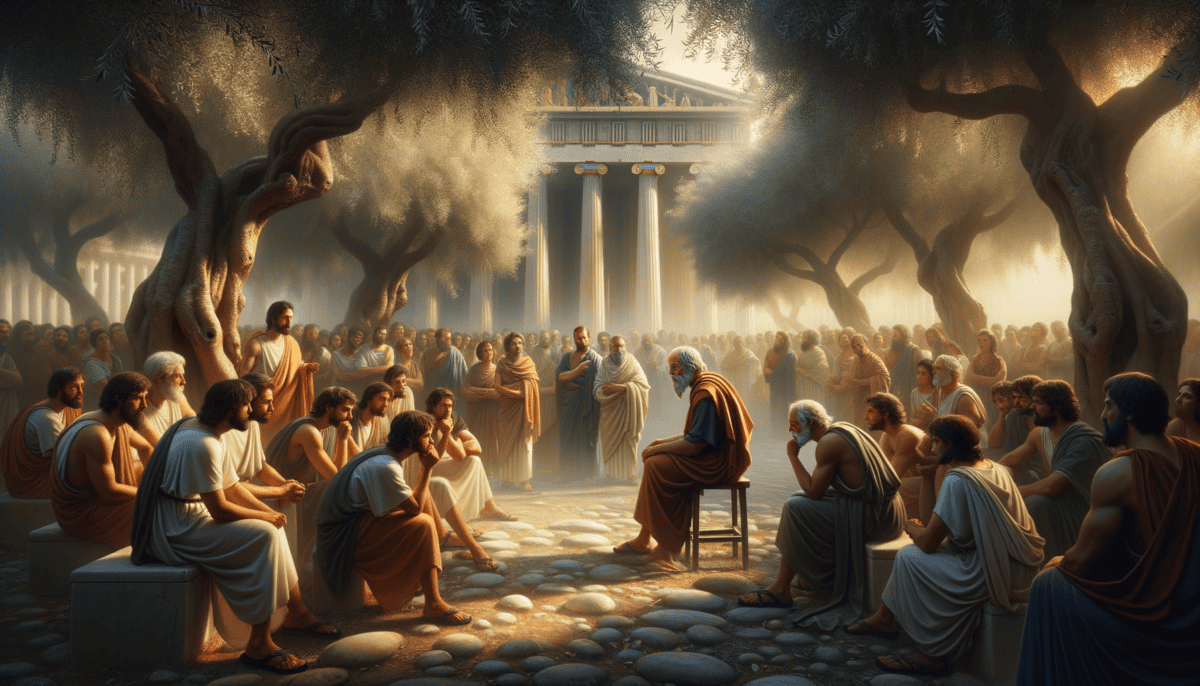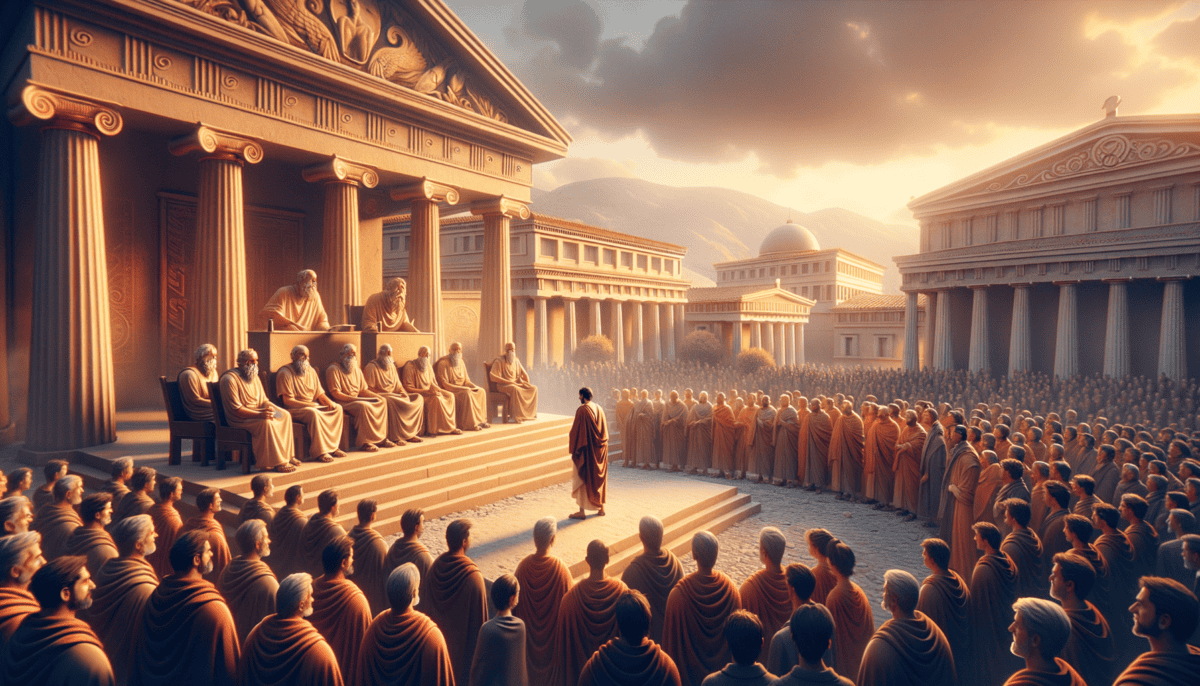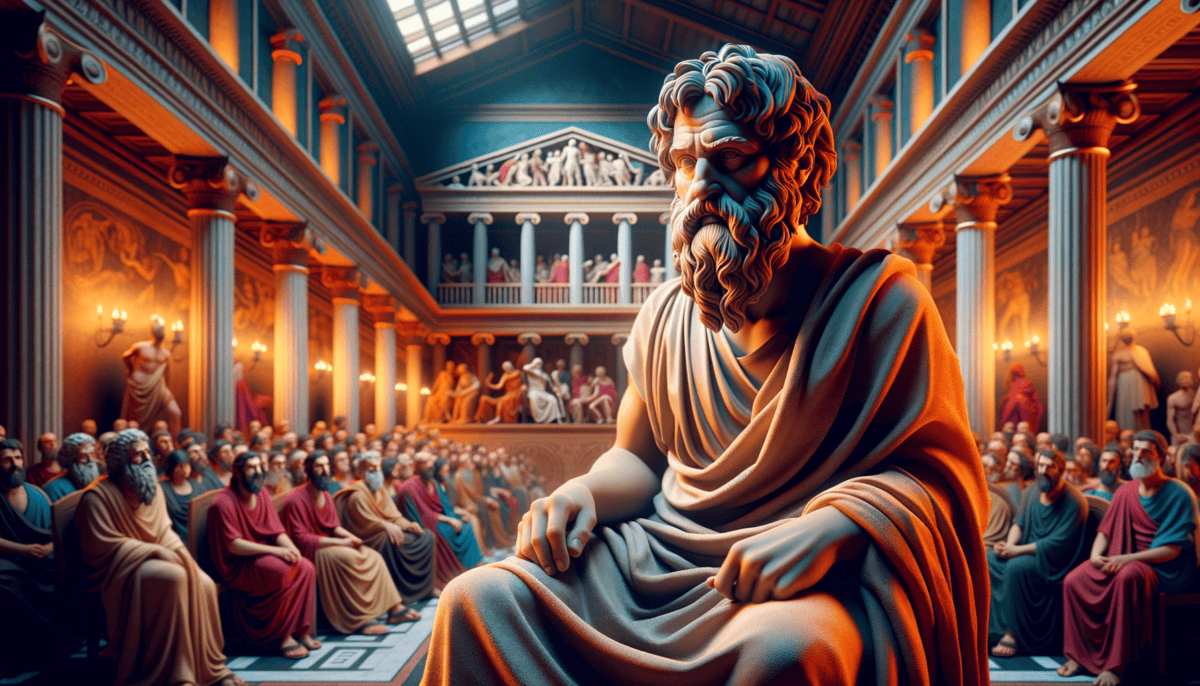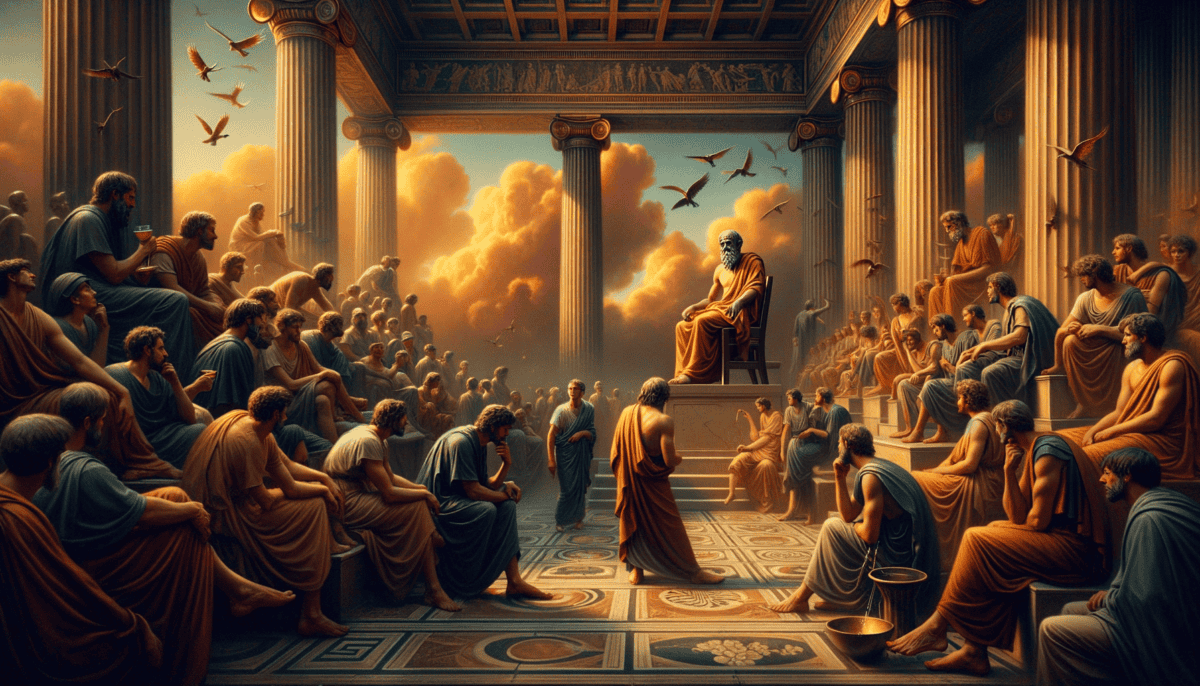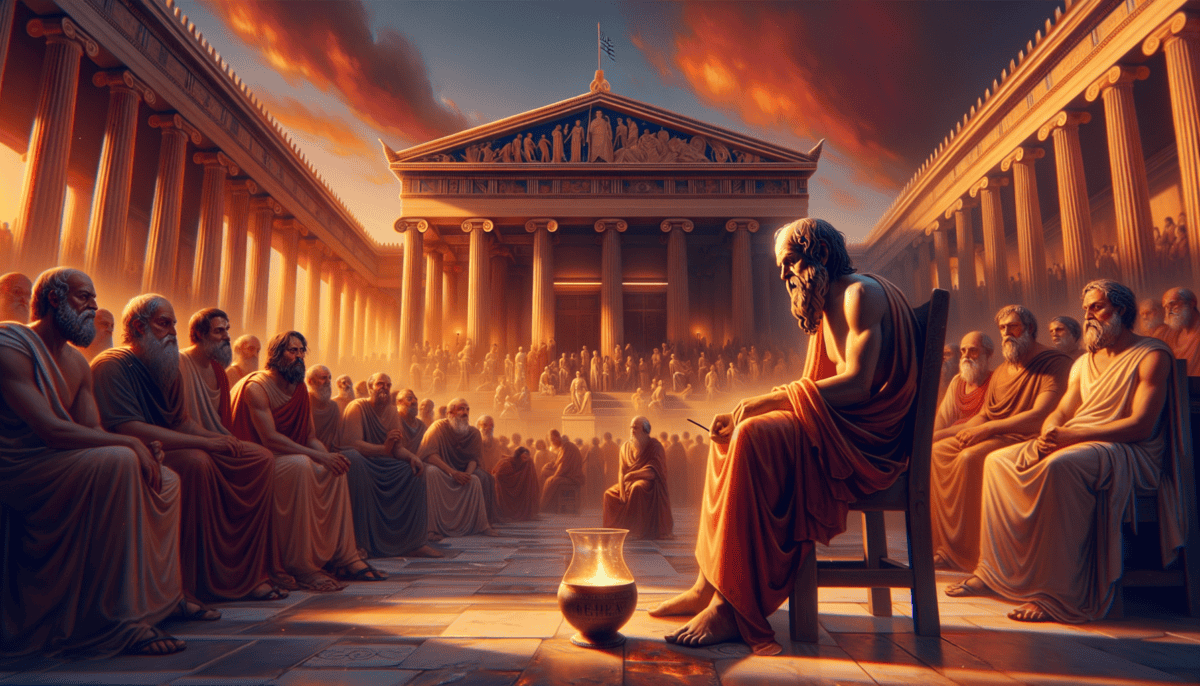A Strange Man in the Market
The sun was bright in Athens. People walked through the busy market. They bought food and traded goods. But one man wasn't there to shop. His name was Socrates.
He looked different from others. His clothes were plain. His beard was messy. But his eyes sparkled with wisdom.
"Why do you sell these apples for two coins?" Socrates asked a fruit seller.
"Because that's what they're worth!" the seller said.
"But how do you know what things are worth?" Socrates smiled. "What makes something valuable?"
The fruit seller scratched his head. He had never thought about it before.
The Man Who Asked Questions
That's what Socrates did best – he asked questions. He talked to everyone: rich people, poor people, young and old. He wanted them to think about big ideas.
"Look at that strange man," people would whisper. "He talks to everyone and never stops asking 'why?'"
Some people loved talking to Socrates. Others got angry when he made them think hard about their beliefs.
Growing Trouble in Athens
Athens was having hard times. They had lost a big war. People were scared and angry. Some leaders didn't like how Socrates made people question everything.
"He's teaching young people to question our gods!" one man shouted in the market.
"He makes them doubt our laws!" said another.
But Socrates kept asking his questions. He believed thinking and asking questions made people better.
The Power of Why
Young people loved following Socrates around. He was like a teacher who didn't need a classroom.
"Why do we believe what we believe?" he would ask them.
"How do we know what is right?"
"What makes someone wise?"
These simple questions made people think in new ways. Some parents were worried their children spent too much time with Socrates.
“The unexamined life is not worth living,” Socrates told his followers. This meant people should think about why they do things.
Dark Clouds Coming
Some powerful people in Athens were getting angry. They didn't like how Socrates made people question everything. They thought he was dangerous.
"He must be stopped," they whispered in secret meetings.
But Socrates wasn't afraid. He believed asking questions was the right thing to do. He wanted everyone to think deeply about life.
The sun was setting in Athens. Socrates walked home from the market. He didn't know it, but big trouble was coming. His questions were about to get him into serious problems with the leaders of Athens.
Teaching the Young Minds
The morning sun filled the olive grove. Socrates sat with his students under a big tree. Young people came from all over Athens to learn from him.
“Tell me,” Socrates asked, “what makes someone a good friend?”
A young man named Plato raised his hand. “Someone who is nice to you?”
“But are they truly your friend if they’re nice to you when you do wrong things?” Socrates smiled. His questions always made people think harder.
Angry Parents
Not everyone liked how Socrates taught. Many parents got mad when their children started asking too many questions at home.
“My son won’t stop questioning everything!” complained one father. “He even asked why he should obey me!”
“He’s teaching them to disrespect our ways!” shouted another.
Problems with Leaders
The city leaders watched Socrates with angry eyes.
“Did you hear what he said about our gods?” whispered one leader.
“Yes, he asked why we believe in them!” said another. “This must stop!”
“We cannot just believe things because everyone else does,” Socrates told his students. “We must think for ourselves.”
Growing Danger
Some of Socrates’ students became very important in Athens. But some did bad things. People blamed Socrates for teaching them wrong.
“Look what your questions lead to!” they said. “Your students cause trouble!”
Socrates just smiled. “I only teach them to think. What they do with their thoughts is their choice.”
A Special Student
One student named Plato wrote everything down. He loved how Socrates made him think in new ways.
“Master,” Plato said, “people are saying bad things about you.”
“Let them speak,” Socrates answered. “I must keep asking questions. It’s the only way to find truth.”
Dark Times Ahead
The anger grew bigger. Some people started making plans against Socrates.
“He’s dangerous!” they said in secret meetings.
“He makes our children doubt everything!”
“Something must be done!”
But Socrates kept teaching. He believed questions were more important than being safe. He didn’t know that soon, his questions would put him in real danger.
The sun was going down over Athens. In homes and meeting places, angry people were making plans. They wanted to stop Socrates from asking any more questions. Big trouble was coming for the wise old teacher.
The Day of Blame
The market square was noisy that morning. People gathered in small groups, whispering. Socrates stood calmly as three men walked up to him.
Bad News
“Socrates,” said Meletus, the leader. “You are charged with two very bad things.”
The crowd got quiet. Everyone wanted to hear.
“First, you make young people not believe in our gods,” Meletus said loudly. “Second, you teach them to be bad.”
• Not believing in Athens’ gods
• Making young people bad
Friends Try to Help
Plato jumped up. “That’s not true! Socrates teaches us to be good!”
But the guards made him be quiet.
Crito, another friend, ran to Socrates. “We can help you run away! You don’t have to stay!”
Socrates smiled and shook his head. “No, my friend. Running away would be wrong.”
Getting Ready
The trial would be in three days. Socrates didn’t look worried at all.
“Why won’t you get a lawyer?” his friends asked.
“I will speak the truth,” Socrates said. “That’s all I need.”
“The truth is like the sun. You can hide it for a while, but it will always shine again.”
The City Gets Ready
All of Athens was talking about the trial. ️
“He asks too many questions!” some said.
“But his questions make us think!” others argued.
The judges picked 500 people to decide if Socrates was guilty. That’s more people than in two big school classes!
A Brave Teacher
The night before the trial, Socrates’ students came to see him.
“Are you scared?” little Xenophon asked.
“No,” Socrates smiled. “I’m only scared of doing wrong things. Telling the truth is always right.”
He looked at his students. “Remember, always ask questions. That’s how we learn what’s true.”
The Big Day Comes
As the sun rose, people filled the streets. They were all going to the big court building.
Socrates walked there slowly. He looked peaceful, like he was just going for a morning walk.
“Good morning!” he said to everyone, even people who didn’t like him.
The court doors opened. Inside, 500 people waited to judge him. Socrates took a deep breath and walked in. He was ready to stand up for what he believed, no matter what happened next.
Standing Strong
The big court room was packed with people. Socrates stood in the middle, looking calm. The morning sun came through the windows.
Speaking Up
Meletus spoke first. He was very angry. “Socrates makes our young people not trust our gods!” he shouted.
The crowd whispered. Socrates just smiled.
“He tells them to ask too many questions!” Another man yelled.
“Questions are like keys. They unlock the door to wisdom.” – Socrates
Socrates Talks Back
When it was his turn, Socrates didn’t look scared at all.
“Dear friends,” he said. “I only help people think. Is thinking bad?”
Some people laughed. Others looked mad.
“I am like a little bee, helping Athens wake up and think!”
The Big Questions
“If you say I don’t believe in gods,” Socrates asked, “why do I talk about them so much?”
Meletus got red in the face. He couldn’t answer.
“And if I make young people bad,” Socrates went on, “why do they become better after talking to me?”
Friends Speak Up
Plato stood up. “Socrates taught me to be good!” he said. “He loves Athens!”
More students stood up. They all wanted to help their teacher. ♂️
“He made me kinder!” said one.
“He taught me to think!” said another.
Not Giving Up
The judges listened. Some nodded. Some frowned.
“Should I say I’m sorry and stop teaching?” Socrates asked. “No! That would be like a bird saying sorry for singing!”
Waiting Time
The sun was going down. Everyone was tired.
“Now we must vote,” the head judge said.
Each person got two pieces of clay. One meant “guilty.” One meant “not guilty.”
Socrates stood tall. He watched as 500 people walked by to vote.
His friends held their breath. Even the birds seemed to stop singing.
The counting began. Everyone waited to see what would happen to the man who taught Athens to think.
When Truth Has a Price
The sun was setting as the votes were counted. Socrates stood quietly, his eyes calm.
The Decision
“Guilty!” The head judge’s voice echoed through the court. More people had voted against Socrates than for him.
Socrates didn’t look scared. He just nodded, like he knew this would happen.
280 said guilty
220 said not guilty
A Hard Choice
“What should your punishment be?” asked the judge. In Athens, people who were found guilty could suggest their own punishment.
Socrates smiled. “Maybe Athens should give me free meals for life. After all, I helped make our city better!”
Some people laughed. Others got angry.
Friends Try to Help
“Please, Socrates!” Plato begged. “Tell them you’ll pay money instead!”
“I could give thirty silver coins,” Crito offered.
But Socrates shook his head. “I won’t say I did something wrong when I didn’t.”
The Final Choice
The judges were not happy. They talked together in low voices.
“Socrates,” the head judge said, “you must drink hemlock. It is poison.”
“I would rather die standing up for what’s right than live by telling lies.” – Socrates
A Chance to Run
That night, Socrates’ friends came to his cell.
“We can help you escape!” Crito whispered. “We have a plan!”
But Socrates just smiled and shook his head. “If I run away, I would be saying the laws don’t matter. That would be wrong.”
Last Teachings
Instead of running, Socrates spent his last days talking with friends. He taught them about being brave and doing what’s right.
“The most important thing is not living, but living well.”
His students wrote down everything he said. They knew his words were special.
Standing Strong
“Aren’t you scared?” a young student asked.
“A good person cannot be hurt by a bad thing,” Socrates answered. “They can only hurt my body, not what I believe in.”
The guards watched as more and more people came to learn from Socrates. Even now, he was still teaching. Still helping people think. Still being brave.
The sun set on another day in Athens. Tomorrow would bring more choices. More chances to be brave. More chances to stand up for what’s right.
The Last Lesson
The morning sun peeked through the prison window. Today was Socrates’ last day.
A Peaceful Morning
Socrates sat calmly on his bed. His friends gathered around him, their eyes sad. But Socrates smiled like it was just another day for teaching.
“Why are you so happy?” asked Phaedo, his young friend.
“Because today we learn our final lesson together,” Socrates replied. ✨
Special Visitors
Xanthippe, Socrates’ wife, came with their three little boys. She was crying.
“Don’t cry,” Socrates said softly. “Remember what I taught you about being brave.”
His wife Xanthippe and sons Lamprocles, Sophroniscus, and Menexenus came to say goodbye.
The Final Hour
As the sun started to set, a guard brought in a cup. Inside was the hemlock poison.
“Wait!” cried Crito. “The sun hasn’t set yet. You don’t have to drink it now!”
But Socrates took the cup. “Waiting won’t make me more alive,” he said with a smile.
The Last Drink
Socrates looked at the cup calmly. His hands didn’t shake at all.
“Should we make a prayer?” someone asked.
“Yes,” said Socrates. “Let’s pray that my journey is happy.”
He drank the hemlock quickly, every last drop.
A Peaceful Goodbye
Socrates walked around his cell, just like the guard said to do. When his legs felt heavy, he lay down.
“Remember,” he whispered to his friends, “keep asking questions. Keep looking for truth.”
“Crito, we owe a rooster to Asclepius. Please pay the debt.”
A New Beginning
Socrates closed his eyes. His breathing got slower and slower. Then it stopped.
But that wasn’t the end. It was just the beginning.
His student Plato wrote down all of Socrates’ teachings. People all over the world still read them today.
Forever Teaching
“The unexamined life is not worth living.” – Socrates
Socrates taught us many things:
• To ask questions
• To think for ourselves
• To stand up for what we believe
• To be brave when things are hard
Even today, more than 2,000 years later, people still learn from Socrates. His ideas changed the world.
Teachers still use his way of asking questions. People still stand up for what they believe in, just like he did.
Socrates may have left Athens that day, but his wisdom never did. It lives in every person who asks “Why?” and looks for truth.
And somewhere, maybe Socrates is still smiling, still teaching, still helping people think about what matters most. ⭐


